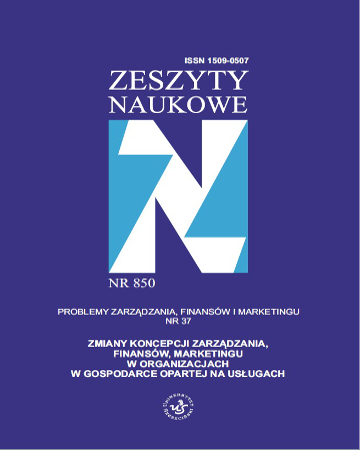
ISSN: 1509-0507
eISSN: 2353-2874
OAI



Issue archive /
ZN 850 PZFiM nr 37
Rola kreatywności w funkcjonowaniu organizacji usługowych
(The Role of Creativity in the Functioning of Service Institutions)
| Authors: |
Andrzej
Raszkowski
Uniwersytet Ekonomiczny we Wrocławiu |
| Keywords: | culture-based creativity 3T concept creative capital service institution creativity |
| Data publikacji całości: | 2015 |
| Page range: | 10 (23-32) |
Abstract
Currently organizations function in a competitive and diversified socio-economic environment. Each component or process influencing their market situation improvement is definitely valuable. The study discusses problems related to the role and significance of creativity with regard to service organizations functioning. The purpose of the article is to present the selected, positive aspects of creativity impact on the functioning of service institutions, with particular emphasis of the areas constituting the responsibility of service organizations’ managers, management systems and these organizations’ offer. The introduction presents theoretical aspects of creativity and the reasons of its growing significance for service organizations. The problems of 3T concept and culture-based creativity are also discussed. The analysis and criticism of the subject literature, based on English-language sources, was used as the research method. Within the framework of general conclusions it can be adopted that creativity has positive impact on the functioning of service institutions, having assumed an effective management process taking into considerations the potential ingrained in creative units.
Download file
Article file
Bibliography
| 1. | Anholt S., Competitive Identity. The New Branding Management for Nations, Cities and Regions, Palgrave Macmillan, New York 2007. |
| 2. | Cohen S., Eimicke W., Heikkila T., The Effective Public Manager. Achieving Success in a Changing Government, John Wiley and Sons, San Francisco 2008. |
| 3. | Flew T., The Creative Industries. Culture and Policy, SAGE Publications, London 2012. |
| 4. | Florida R., The Rise of the Creative Class. Revisited, Basic Books, New York 2012. |
| 5. | Gallaher M., Link A., Petrusa J., Innovation in the U.S. Service Sector, Routledge, New York 2007. |
| 6. | Green A., Creativity in Public Relations, Kogan Page Publishers, London 2010. |
| 7. | Hennessey B., Amabile T., The Conditions of Creativity, w: The Nature of Creativity: Contemporary Psychological Perspectives, red. R.J. Sternberg, Cambridge University Press, New York 1988. |
| 8. | Labour Force Survey, Eurostat News Release, European Commission, Publications Office of the European Union, 142/2012, Luxembourg, 5 October 2012. |
| 9. | Landry C., Bianchini F., The Creative City, Demos, London 1998. |
| 10. | Managing Creativity and Innovation. Practical Strategies to Encourage Creativity, Harvard Business Essentials, Harvard Business School Publishing Cooperation, Boston 2003. |
| 11. | Olmstead J., Creating the Functionally Competent Organization. An Open Systems Approach, Greenwood Publishing Group, Westport 2002. |
| 12. | Oort F., Raspe O., Urban Heterogeneity in Knowledge – Related Economic Growth, w: Knowledge Externalities, Innovation Clusters And Regional Development, red. J. Surinach, R. Moreno, E. Vaya, Edward Elgar Publishing, Cheltenham 2007. |
| 13. | Raszkowski A., Creativity in the Context of Regional Development – Selected Issues, w: Regional Economy in Theory and Practice, red. E. Sobczak, A. Raszkowski, Research Papers of Wrocław University of Economics 286, Publishing House of Wrocław University of Economics, Wrocław 2013. |
| 14. | Raszkowski A., Culture-based Creativity in Relation to Enterprise Development Strategies, w: Academic Coordination Centre and Technology Transfer in Euroregion Neisse-Nisa-Nysa, red. K. Biniek, T. Winnicki, Karkonosze College in Jelenia Góra, Jelenia Góra 2014. |
| 15. | Recent Trends in U.S. Services Trade, 2014 Annual Report, United States International Trade Commission, Washington 2014. |
| 16. | The Impact of Culture on Creativity, A Study prepared for the European Commission (Directorate – General for Education and Culture), KEA European Affairs, Brussels 2009. |